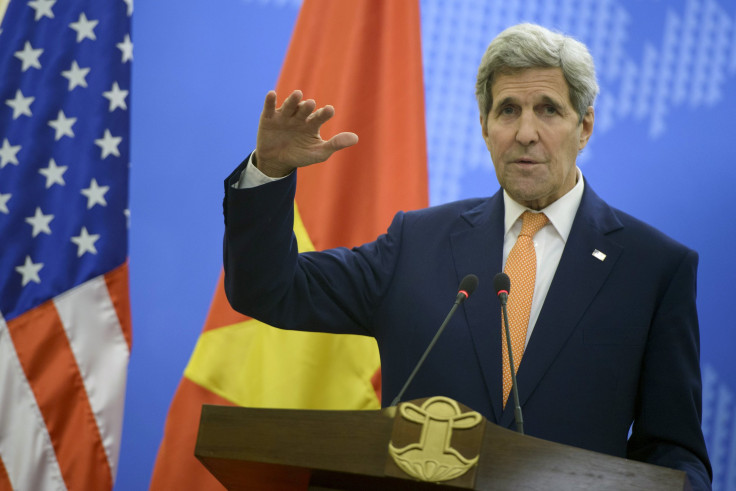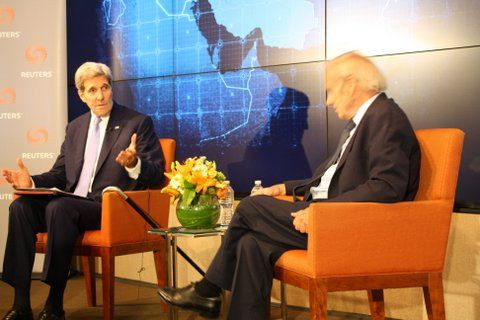John Kerry On Iran Nuclear Deal: Could Help International Relations, Aid In Anti-ISIS Fight

U.S. Secretary of State John Kerry defended the deal reached last month with Iran to curb its nuclear capabilities, arguing Tuesday that the United States would lose its international credibility if it were to walk away from an agreement with the Islamic Republic so late in the process. He signaled that the nuclear agreement could bring about the opportunity for long-term engagement with Iran to solve other regional issues, potentially easing decadeslong tensions with the country.
"Iran specifically said to us 'If we can get this agreement, we are prepared to talk to you about the other issues,' and I believe that is an opportunity," Kerry said during a conversation with media at Reuters' offices in New York City. He said an agreement with Iran, followed by eased relations, could even lead to cooperation in the fight against the Islamic State group, also known as ISIS or ISIL, and arriving at a solution to bring about peace in Syria.
"I'm not going to tell you Iran is going to change, we're not sitting here and betting on it," he said, reasserting that the nuclear agreement was based on accountability and the ability for inspections of Iran's facilities, rather than just trust. "I will tell you this deal is a good deal. It gets the job done," Kerry said.

As part of the deal, international sanctions against Iran will be lifted in exchange for a 10-year commitment from the country to freeze its nuclear program and allow for inspections of its nuclear facilities. Kerry warned that failing to pass an agreement would result in Iran advancing its nuclear weapons program, and said the terms of the agreement allowed for an unprecedented degree of inspections.
"When people say, 'Oh my gosh, I'm worried what happens year 15 or 20 and then they become a nuclear threshold nation' -- Folks, they are a nuclear threshold nation today," he said.
The agreement has come under intense scrutiny from Republicans in Congress who have argued Iran cannot be trusted to abide by the terms of any agreement. U.S. President Barack Obama's administration has defended the deal on the basis that it allows unprecedented access to Iran's facilities and will be based on verification rather than trust.
"We have enough intelligence capacity to know what they're doing, and we will," Kerry said.
"It is surely the pursuit of peace that is most needed in this world so full of strife." —President Obama #IranDeal
— Barack Obama (@BarackObama) August 5, 2015Congress is expected to conclude a 60-day review of the deal and vote whether to accept it Sept. 17. If Congress votes against the deal, Obama is likely to rely on his presidential veto to override the decision and has been campaigning to summon enough support among Democrats to ensure opponents of the deal are not able to secure the two-thirds congressional majority necessary to override a veto.
A number of key Democrats, including Sen. Chuck Schumer, D-N.Y., have recently indicated their opposition to the deal. Former Connecticut Sen. Joseph Lieberman has also become a vocal critic of the deal and is a key member of United Against Nuclear Iran, an advocacy group hoping to thwart the agreement.
Asked how the Obama administration would respond if Congress were to defeat the deal, Kerry responded: "I'm not going to discuss Plan B because we're going to be successful with Plan A."
Defending the deal earlier this month, Obama said it was the most significant foreign policy decision facing lawmakers since the vote for war with Iraq in 2002. He said the deal provided a diplomatic means and a long-term solution to avoiding an armed conflict with Iran while also ensuring the country was unable to develop nuclear weapons.
© Copyright IBTimes 2025. All rights reserved.






















